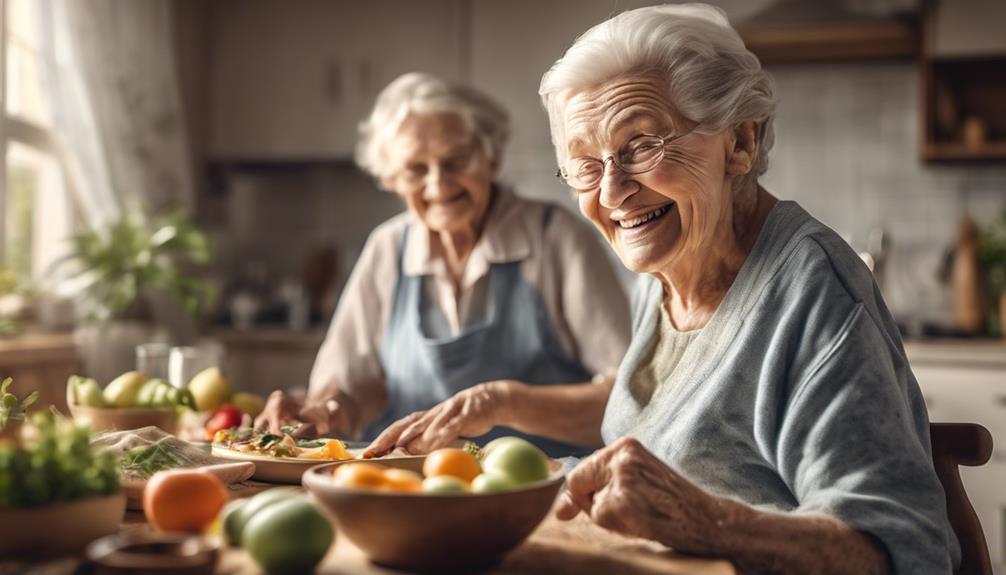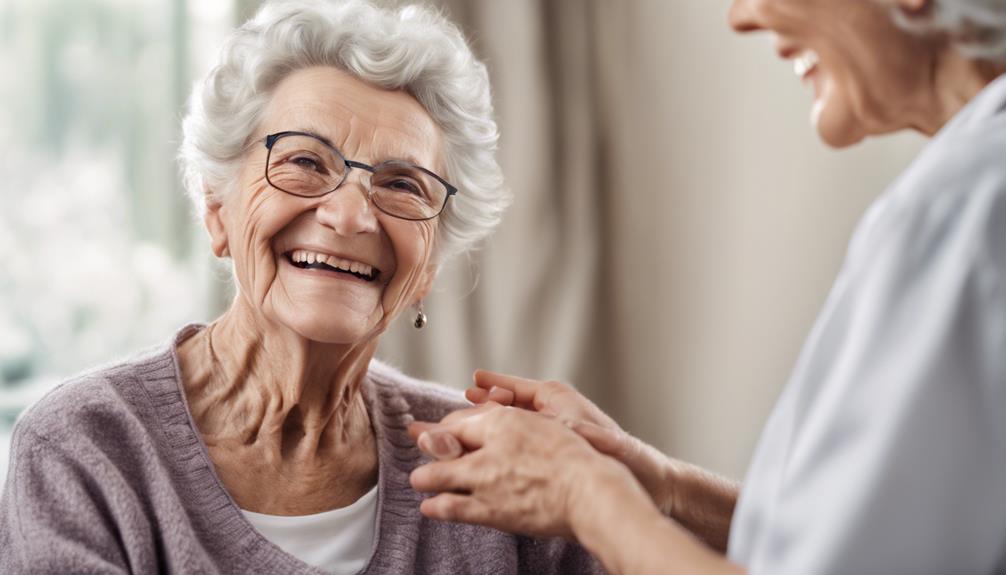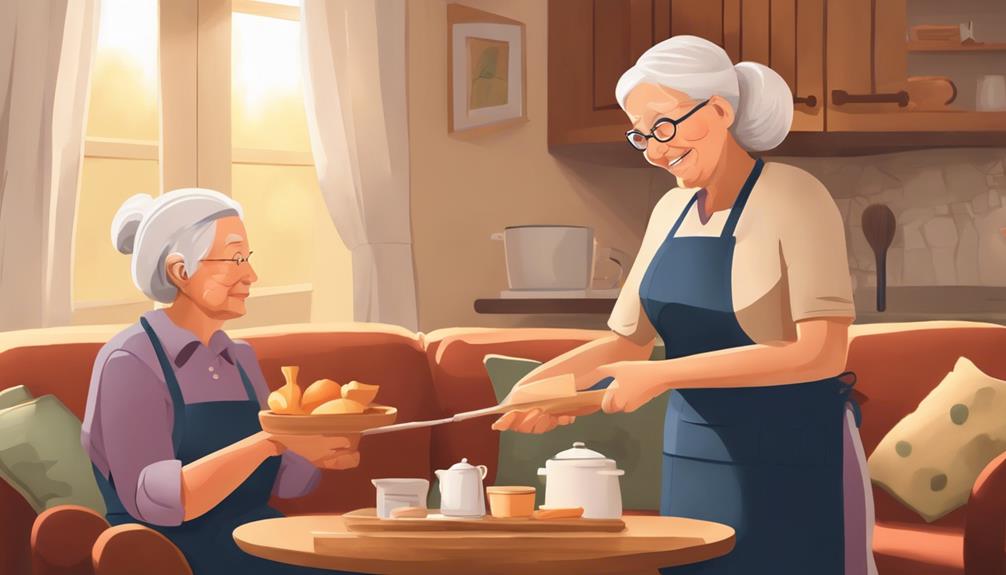In-home caregivers provide personalized support and assistance in the comfort of your own home, making daily life easier. They assist with tasks, offer companionship, and customize care to meet your unique needs, which promotes independence and well-being. Caregivers respect your preferences and ensure autonomy, fostering a sense of belonging and value. Their support improves quality of life, fights loneliness, and nurtures emotional well-being. With caregivers, you can maintain independence, participate in activities, and enjoy social interactions. Learn more about the benefits of in-home caregivers for transforming everyday life into a more comfortable and enriching experience.
Key Takeaways
- In-home caregivers provide personalized care for seniors' well-being and independence.
- Assistance with daily tasks and emotional support enhance seniors' quality of life.
- Tailored care plans promote autonomy and independence for seniors.
- Companionship and interactions alleviate loneliness and support mental health.
- Caregivers enhance daily living by maintaining independence and promoting social engagement.
Benefits of In-Home Caregivers
In-home caregivers play an essential role in enhancing the well-being and independence of seniors by providing personalized care in a familiar setting. Seniors benefit greatly from the presence of in-home caregivers, who not only assist with daily tasks but also contribute to their emotional well-being.
The personalized care offered by these caregivers is tailored to the unique needs of each senior, ensuring that they receive the support necessary to maintain their independence. By receiving care in the comfort of their own home, seniors can feel more at ease and content, which positively impacts their overall satisfaction with life.
In-home caregivers not only help with practical tasks but also provide companionship, alleviating feelings of loneliness and promoting mental health. This support enables seniors to age in place, maintaining a sense of familiarity and security while enhancing their emotional well-being.
Through personalized care, in-home caregivers create a nurturing environment that fosters autonomy and a high quality of life for seniors.
Personalized Care Plans

Crafting tailored care plans in in-home caregiving involves closely collaborating with clients and their families to address specific physical, emotional, and social needs. When providing senior care, personalized care plans are vital for meeting individual needs effectively.
Here are four key aspects of creating personalized care plans as an in-home care provider:
- Compassion: A compassionate approach is essential when designing care plans to make sure seniors feel understood and valued.
- Understanding Individual Needs: By taking the time to comprehend each senior's unique requirements, we can offer the most beneficial support.
- Collaboration with Families: Involving families in the care planning process helps create a holistic approach that considers the senior's preferences and family dynamics.
- Tailoring Support: Personalized care plans allow us to customize our support to the specific needs of each senior, promoting their well-being and independence.
Promoting Independence and Autonomy
Supporting seniors in maintaining their independence and autonomy, in-home caregivers assist with daily tasks and activities to promote a sense of control and well-being. Personalized attention is a key aspect of our caregiving approach, allowing seniors to retain decision-making power over their lives. By respecting individual preferences and providing assistance while upholding dignity, we create an environment where seniors feel empowered and valued. This personalized care not only enhances their sense of independence but also adds greatly to their overall well-being.
Seniors benefit greatly from the ability to continue living comfortably and confidently in their own homes with the help of our services. Through tailored support that focuses on promoting independence and autonomy, we aim to guarantee that seniors maintain a high quality of life. By offering assistance that's sensitive to their needs and preferences, we aim to empower seniors to lead fulfilling lives with a strong sense of control and dignity.
Emotional Well-being Support

Enhancing seniors' emotional well-being through personalized care and meaningful interactions is a core focus of our in-home caregiving services. Seniors often experience feelings of loneliness and isolation, which can impact their mental well-being. Our caregivers provide essential emotional support to alleviate these feelings and create a sense of companionship.
Here are four ways we address emotional well-being:
- Reducing Loneliness: Our caregivers offer companionship and regular interactions to combat feelings of loneliness, keeping seniors socially engaged.
- Promoting Meaningful Conversations: Through engaging conversations and activities, we help seniors stay mentally stimulated and connected.
- Fostering Belonging: The companionship provided by our caregivers helps seniors feel a sense of belonging and inclusion within their own homes.
- Providing Comfort: Our care services offer a source of comfort and support, ensuring seniors feel valued and cared for in a familiar environment.
Companionship and Assistance
Providing companionship and assistance, in-home caregivers play an essential role in improving the daily lives of seniors by offering support with daily activities and fostering meaningful interactions.
Seniors benefit greatly from having caregivers who assist with tasks like grooming, dressing, and meal preparation, allowing them to maintain their independence while receiving the help they need. In addition to physical assistance, caregivers engage seniors in conversations and activities to promote mental well-being.
By encouraging social interaction and community engagement, caregivers help seniors combat feelings of loneliness and isolation, creating a fulfilling life within the comfort of their home. Caregivers respect seniors' preferences and decisions, supporting their independence and ensuring a sense of control over their daily routines.
Through a combination of companionship, assistance with daily activities, and social interaction, in-home caregivers enhance the quality of life for seniors, making living at home a more enjoyable and manageable experience.
Enhancing Quality of Life

Enhancing quality of life involves improving daily activities, providing social engagement opportunities, and offering personalized care services.
Daily activities like meal preparation, light housekeeping, and medication reminders can be made easier with the help of in-home caregivers. These caregivers also create opportunities for seniors to connect with others, engage in hobbies, and maintain a sense of purpose, all contributing to a higher quality of life.
Improved Daily Activities
Supporting seniors with their daily activities at home greatly contributes to their overall well-being and independence. In-home caregivers provide specialized care to enhance the quality of life for seniors by assisting with various tasks and activities. Here are four ways in which improved daily activities can make a positive impact:
- Helping with bathing, dressing, and grooming routines to promote independence.
- Providing medication reminders and management for better health and well-being.
- Offering companionship and social interaction to improve emotional health.
- Assisting with household tasks like cooking, cleaning, and errands to guarantee a comfortable living environment.
Social Engagement Opportunities
Regular interactions with in-home caregivers create meaningful connections and combat loneliness, enhancing seniors' quality of life. In-home caregivers provide social engagement opportunities that go beyond just physical care. They engage in conversations, activities, and offer companionship, which are essential for mental well-being and emotional support.
By offering support for engaging in the outside world, caregivers help reduce feelings of isolation and promote a sense of belonging. Seniors benefit greatly from the social interactions and connections fostered by caregivers, leading to improved overall quality of life.
These interactions not only combat loneliness but also provide a sense of purpose and fulfillment, making each day more enjoyable and meaningful for those under in-home care.
Personalized Care Services
In-home caregivers provide personalized care services that cater to seniors' individual needs and preferences, greatly enhancing their quality of life.
- Care plans are crafted to maintain daily routines and promote comfort.
- Providing companionship supports emotional well-being and social interaction.
- Engaging in activities of daily living fosters independence and mental stimulation.
- Assistance with tasks like cooking, housekeeping, and medication reminders contributes to seniors' autonomy.
Impact on Aging in Place

Seniors who receive care in their own homes experience a significant positive impact on their ability to age comfortably and safely in familiar surroundings. In-home caregivers provide personalized support tailored to the specific needs of seniors, allowing them to maintain their independence and dignity while staying at home. This personalized care plays an essential role in enhancing emotional well-being and overall satisfaction with life for seniors. Additionally, in-home caregivers offer companionship and social interaction, helping to alleviate feelings of loneliness and isolation commonly experienced by seniors aging in place. Furthermore, family caregivers benefit from respite care services provided by in-home caregivers, enabling them to take a break, recharge, and prevent burnout, ultimately ensuring the well-being of both seniors and their family caregivers.
| Benefits for Seniors Aging in Place | |
|---|---|
| Enhanced emotional well-being | Personalized support |
| Increased satisfaction with life | Alleviation of loneliness |
| Maintenance of independence | Social interaction |
| Improved quality of life | Safety and comfort in familiar surroundings |
Frequently Asked Questions
What Skill Can Often Help a Caregiver Make the Best Out of a Tough Situation?
Active listening can often help us make the best out of tough situations as caregivers. By truly understanding our clients' needs and feelings, we can navigate challenges effectively, providing compassionate and supportive care.
What Is a Caregiver Wife Burnout?
Caregiver wife burnout is the exhaustion felt by women caring for partners. It includes fatigue, anxiety, and isolation due to intense care duties, lack of support, financial strain, and neglecting personal needs. Seeking professional help and self-care are essential.
When Should You Stop Being a Caregiver?
When we feel overwhelmed and our well-being is at risk, it's important to think about shifting to professional in-home care. Recognize signs of caregiver burnout and prioritize self-care. Consulting healthcare professionals guarantees the best care for our loved ones.
What Is Caregiver Fatigue?
Caregiver fatigue is physical, emotional, and mental exhaustion from caregiving demands. Symptoms include irritability, lack of energy, and difficulty concentrating. Recognizing and addressing fatigue is vital for quality care. Seeking support and self-care strategies can help. It’s common for caregivers to experience feelings of guilt when taking time for themselves, a concept known as *overcoming caregiver guilt*. However, understanding that personal well-being is essential to providing effective care can help alleviate this guilt. By acknowledging one’s limits and seeking support from family, friends, or professional resources, caregivers can focus on sustaining their resilience for the long term.
Conclusion
To sum up, in-home caregivers play a vital role in making daily life easier for those who need assistance. With personalized care plans, emotional support, and companionship, they help promote independence and enhance quality of life.
So, next time you wonder about aging in place, remember the invaluable support that in-home caregivers provide. How can we not appreciate their dedication and impact on our well-being?









